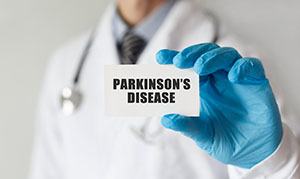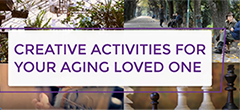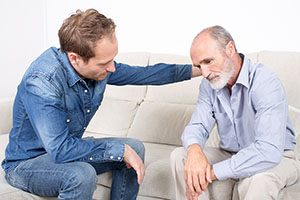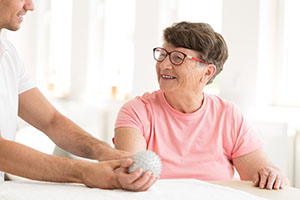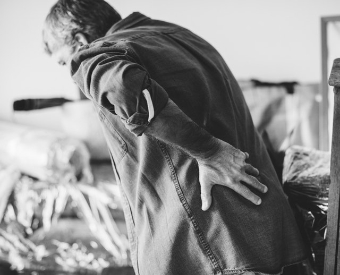Make an Appoinment
According to the Parkinson’s Foundation, about a million people in the United States (and 10 million people worldwide) are living with Parkinson’s disease, while another 60,000 Americans receive the diagnosis every year. This progressive nervous system disorder is most common in those over age 60, but it can impact younger individuals, as well. If someone in your life suffers from Parkinson’s, you well know the challenges they face with tremors, imbalance, stiffness and coordination. As the disease progresses, these tremors may start to interfere with daily life, and they might face additional symptoms like depression, emotional issues, sleep disorders, trouble eating and incontinence. Securing home care services, becoming a caregiver yourself, or a combination of both options will help your loved one live the highest quality of life possible within the scope of his or her symptoms. The Michael J. Fox Foundation, Caring.com, and Healthline share these suggestions to help offer the best care for your loved one with Parkinson’s: Be There for Medical Visits Your loved one will appreciate the moral support of your presence at the doctor’s office, but it’s also important that you listen carefully and take notes regarding their condition. They may not be able to remember all the details. The doctor may also be able to offer some advice to you as a caregiver. Stay Informed Read as much as you can about Parkinson’s so you understand the disease and what your loved one will go through. You’ll also want to be well-versed about your loved one’s insurance: what type of coverage do they have for prescriptions, therapy and long-term needs? Watch for Changes Parkinson’s doesn’t affect everyone the same way. Some cases progress more quickly than others. Watch your parent or loved one carefully to notice any changes in their movement or behavior as the result of the disease or perhaps as a side effect of certain medications. Always report any changes to their doctor. They might not notice the changes or forget to tell their doctor. Get Organized You’ll need to keep track of medical and therapy appointments as well as prescriptions. Help ensure your parent or loved one is taking all necessary medications on schedule. Listen Allow your loved one to retain as much independence as possible. They may need more help later on but continue to offer what is necessary and welcome. Listen as they talk about their needs and concerns. Chances are, they are also afraid and might appreciate the opportunity to talk about their feelings. Ask for Help It takes a team to care for a loved one with Parkinson’s. Don’t hesitate to ask for help when you need it. This is essential to prevent caregiver burnout. Being the best possible caregiver for your loved one with Parkinson’s means taking care of yourself, too. You may find that some in-home assistance to help with simple tasks such as grocery shopping and errands might provide you with a lot of relief and extra time. You might also consider joining a support group for caregivers. It’s helpful to have the support and advice of people who are experiencing a similar journey. Get Professional Assistance In addition to your loved one, you may also have a career and a family that need your attention. Working with a home care company will allow yourself more time to focus on your loved one with Parkinson’s as well as the other areas of your life. It’s not unusual to feel overwhelmed or stressed caring for a loved one. Be sure to seek help when you need it. Elderlink Home Care, Inc. has been serving the Denver area with home care assistance for over 30 years. We send caregivers into the home to assist you or your loved one with the activities of daily living. Don’t wait until you feel burned out, resentful or overwhelmed caring for your loved one, please contact us to help ensure your loved one is able to age in place with comfort and dignity.
As we get older, certain conditions become much more common. While most of us think of arthritis, muscle pain, or insomnia, one of the more insidious conditions that plague seniors is depression. The only thing worse than how common depression is in seniors, according to the National Institute on Aging, is how hard it can be to manage. While depression can be a struggle, the following tips can help you manage it in your aging loved ones. Tip #1: Look For The Symptoms The first thing you have to do in order to manage depression is to recognize the symptoms in your loved ones. While things like lethargy and distraction may be due to natural aging, there are other, clearer symptoms that should run up red flags when you see them. Things like not eating for extended periods of time, or no longer taking pleasure in activities that once brought them joy. This list of potential symptoms of senior depression from Help Guide is good to keep around. Also, remember, everyone gets sad sometimes. It’s when these symptoms stick around and refuse to go away that you need to start worrying over them. Sadness or feelings of despair Unexplained or aggravated aches and pains Loss of interest in socializing or hobbies Weight loss or loss of appetite Feelings of hopelessness or helplessness Lack of motivation and energy Sleep disturbances (difficulty falling asleep or staying asleep, oversleeping, or daytime sleepiness) Loss of self-worth (worries about being a burden, feelings of worthlessness or self-loathing) Slowed movement or speech Increased use of alcohol or other drugs Fixation on death; thoughts of suicide Memory problems Neglecting personal care (skipping meals, forgetting meds, neglecting personal hygiene) Tip #2: Keep Your Lines of Communication Open Depression is like a weight hanging around your shoulders, and even if you want to reach out to others for help it can feel like a monumental task to do so. That’s why you need to take the initiative, and check-in with your loved one. Not just a casual, “Hey, how are you doing?” either. You need to establish open communication, and to build trust between the two of you. Most importantly, you need to reach for your loved one, and make sure they have support from you. Because on days where things are really bad, they may not be able to reach for you. Tip #3: Let Them Do Things On Their Own It’s an unfortunate truth that the older we get, the more things we can no longer do on our own. Even things we once took for granted, like quickly going up a flight of stairs or driving might be out of reach. However, as anyone who has needed a little assistance to get through the day can tell you, it’s important to still do things for yourself. So, if your loved one is depressed, don’t just complete tasks for them. Instead, support them, and let them do things for themselves. It will give them a sense of accomplishment, instead of feeling like a burden. Tip #4: Create A Sense of Purpose Seniors who don’t have anything to do with themselves can often feel listless and disconnected. This is why so many seniors seek out volunteer work, hobbies, or other activities to keep themselves busy. This sense of purpose can help manage depression, help build community ties, and keep the senior engaged in meaningful ways. There is only so much you can do on your own when it comes to managing an elderly loved one’s depression. While you might be able to handle some days, it’s important to talk with the senior in your life about seeing a professional. Therapists can dedicate time, effort, energy and resources to helping your loved one in ways you might not be able to and they’ll have greater insight into the problems being faced. Not only that, but professionals may be able to find solutions that you and your loved one can both work toward, acting as a trailblazer to help guide you through the tangled jungle that depression can become. In addition, you might want to explore how home care could help ease the load on you and the depression for your loved one. Elderlink Home Care, Inc. can offer a whole range of assistance with activities of daily living. To find out more, simply give us a call.
Unfortunately, scams that target the elderly are all too common. Many scammers are looking to take advantage of elderly individuals: people who are vulnerable or more susceptible to their wiles. By understanding the potential scams out there, you can help protect the elderly people in your life from being victims. The Grandparent Scam In the grandparent scam, a scammer will call and pretend to be a relative. They’ll claim that they’re in trouble in some way, often financially, and that they need immediate assistance. Many scammers will pretend to be a beloved grandchild, begging the grandparent, “Don’t tell Mom and Dad! They’ll be so disappointed in me if they know.” Sometimes, they’ll claim to be in jail and need money for bail; other times, it may be a case of needing money wired to them immediately while they’re traveling. Protecting Your Loved One: Encourage your loved one to always verify information from callers claiming to be relatives. Tell them to insist that they’ll call them back, then check out the story with other relatives. Remind them that none of their grandchildren will ask them to keep a secret if they’re in trouble. The Medicare Card ID Theft Scam Medicare offers a huge advantage for many seniors: free or low-cost medical care. Scammers are well aware of the value of Medicare, and they’ll try to get their hands on seniors’ information. They may claim to be from Medicare or to be from a doctor’s office that needs that information in order to process payment. Protecting Your Loved One: Personal information, including social security numbers, banking information, or Medicare ID information, should never be given over the phone. If you do receive a call from someone claiming to be from an official agency, keep in mind that they’re unlikely to request information from your loved one. Remind them to keep information private and verify who they’re speaking to before handing over any information. The Lottery Scam “Congratulations! You’ve just won…” The lottery. A chance to go on a free cruise. An incredible prize package worth tens of thousands of dollars. There’s just one little catch: before you can claim your prize, you’ll need to make a small deposit, purchase a gift card, or take another key step. Of course, the reality is that there is no prize. Once the deposit is made, the “prize” will disappear, and your loved one may not be able to get their money back. Protecting Your Loved One: Remind your loved one that if they’ve won a legitimate prize, they won’t be asked to provide banking information over the phone–and they certainly won’t be required to pay for the prize. They should also keep in mind that they can’t possibly win something that they haven’t entered. Utility Fraud Many scammers pretend to be from the utility company: water, power, gas, or electricity. They’ll call up warning seniors that their utility is about to be cut off for nonpayment, sending them into a panic. In most cases, seniors will quickly offer payment to avoid this style of retribution. Protecting Your Loved One: Remember, utility companies don’t call to get payment–especially not as a first line of approach. Instead, they’ll typically send letters letting your loved one know that payments are behind. Have them check online or call the utility company directly to verify any problems with payment, rather than simply issuing an immediate payment over the phone. Counterfeit Medications As your loved one ages, the cost of medications increases–and many seniors, as a result, turn to online pharmacies, many of which are based outside of America. There are a lot of counterfeit products out there, including anti-aging products that claim to be able to slow the symptoms of aging. Protecting Your Loved One: Keep an eye on the medications that your loved one is taking. Make sure that they aren’t falling victim to any anti-aging scams or other key problems. Often, protection is as simple as ensuring that their medications are coming from a reputable source. Reverse Mortgage Scams A reverse mortgage will allow your loved one to take out some of the equity they’ve build in their home, allowing them to access funds that they need for medical care, home repairs, and other key things in their lives. Unfortunately, many scammers will simply convince your loved one to transfer home ownership to them without providing them with the funds they need. Protecting Your Loved One: Reverse mortgages can be a very valuable and useful tool for seniors. However, like so many other things, shouldn’t be arranged over the phone. If this is something your loved one wants or needs, encourage them to ask friends, family or trusted advisors for referrals and arrange to visit a physical location instead. Internet Fraud You’re probably familiar with this one. A scammer calls up, insisting that a computer in the home is simply filled with viruses. The scammer will offer free security, a diagnosis, and a repair over the phone. All they need is remote access to the computer–which will then be infected with a slew of viruses. Protecting Your Loved One: Remember, if you haven’t called for tech support, they aren’t going to call you–and Windows isn’t monitoring your machine. Let your loved one know where to receive real tech support and how to deal with it when there is something wrong with their computer. Contractor Scams Over time, repairs do need to be made to your loved one’s home. So-called contractors often take advantage of the elderly, offering services and taking payment, then never showing up to do the work. Not only is your loved one left without the repairs done, they’ve been cheated out of the repairs that actually needed to be performed! Protecting Your Loved One: Always research contractors before hiring them to do work. Make sure that your loved one is protected by a contract. If your loved one is struggling with dementia or no longer seems able to handle what’s going on around them, our Elderlink Home Care,
After a stroke, many people ask the question “What do I do now?” No one expects to have a stroke, and it can be devastating when it happens. Everyone has a different length of recovery, and everyone typically worries about the same things. Whether you or your loved one has suffered a stroke, there are several important things to know about the recovery process. Use Your Primary Doctor Immediately upon leaving the hospital after a stroke, arrangements should be made for the patient to see their primary doctor. The physician will give you invaluable information on how to stay healthy, and ensure proper rehabilitation. He or she will inform you about treatment options, as well as any other specialists that you may need to see. Your primary doctor is one of your best resources in this difficult situation. Reduce the Risk of Additional Strokes The main concern of the stroke survivor and their families is the risk of having repeat strokes. Talk to your diet about diet, exercise, medications, and a course of treatment. Make sure he or she outlines exactly what you need to do, and certainly don’t hesitate to ask questions! If there is anything that you are unclear about, ask for clarification. Ask your doctor for recommendations about what your daily routine should be in terms of reducing the risk of repeat strokes. What Does Recovery Depend Upon? Since no two situations are alike, this varies from person to person. Some people may recover in a few months, while it takes others several years. That being said, the factors that your recovery depends upon are: the percentage of the brain that was affected by the stroke, the course of treatment and rehabilitation that the patient receives, and, most importantly, the motivation of the patient to take the necessary steps toward recovery. Family members need to check in regularly with patients and make sure they are eating healthy, getting proper exercise, and enough sleep. Make sure that the patient is following all of the doctor’s orders exactly in order to make the road to recovery as efficient as possible. The Importance of Repetition Many people, both patients and family members, may not realize just how important repetition is when recovering from a stroke! Neuroplasticity is rebuilt, and the brain is rewired to make new connections. It is vital that the patient not grow frustrated with the process. At times, even simple tasks need to be relearned after suffering from a stroke. The patient will benefit from exercises such as repeatedly lifting a small weight. Ask your doctor which exercises you should be doing on a regular basis that will have the most benefit. Know How Much is Enough While exercise is important after experiencing a stroke, the patient still needs to pace themselves. Light exercises, such as a walk around the block, are highly effective for stroke survivors. The patient should never push themselves to do more than they are comfortable with. If you feel that you need a day to rest, certainly take it. There is no benefit in overdoing it, so have realistic expectations of what you should or should not do. Recovery is Possible Positive thinking is of utmost importance after a stroke. Patients and family members should never make comparisons between two or more people. Remember, every stroke is different, and each patient will have different needs. Never give up or get discouraged. Family Support is Vital for Stroke Survivors Survivors need to know that they have family members that they can depend upon. Having a sense of security for personal needs is important in a person’s recovery. The best thing you can do for a loved one who has suffered a stroke is to be there for them as much as possible. At Elderlink Home Care, Inc. we understand the stress that stroke recovery can put on the survivor and his or her family. We can help ease the stress on both the family and the stroke survivor by placing caregivers into the home to provide assistance with the activities of daily living. We can lighten the load for everyone involved. If we can help, contact us today, or call us at (303) 734-0641.
Sleeping patterns change as people age. In fact, one study has shown that the majority of older adults experience some symptoms of sleep disorders, demonstrating the obvious need to help seniors sleep better. There are many reasons for this. Illnesses and their corresponding medications can cause sleep disruptions like insomnia or dreams that might affect sleep. Even something as positive as retirement can impact the quality of someone’s sleep because suddenly a lifetime routine is thrown off balance. A poor night’s sleep can lead to daytime fatigue and possibly more serious issues. The Centers for Disease Control and Prevention explains that lack of sleep contributes to impaired judgment and chronic health conditions like diabetes, high blood pressure, obesity, and heart disease. If your aging loved one or client isn’t sleeping well, there are a few simple things that may help. Simple Rituals to Help Seniors Sleep Better at Night 1. Make the Bedroom a Sleep Zone When you use your bedroom for a variety of activities, like browsing the internet, crafting, or watching television, your body doesn’t know what’s expected of it when you go in there. By making the bedroom a ‘sleep-only’ zone, your body knows it’s time to wind down and go to sleep when you’re in there. Choose a comfortable mattress and shades that block the light and help control the temperature so it’s conducive to sleep. 2. Establish a Regular Bedtime Mayo Clinic suggests going to bed and waking up at the same time every day, because, “Being consistent reinforces your body’s sleep-wake cycle.” When your bedtime approaches, your body will know it’s time to sleep. 3. Don’t Drink Alcohol Close to Bedtime Even though that glass of wine may make you feel sleepy, it interrupts your sleep during the night by blocking REM sleep (the most restorative sleep), contributing to breathing problems and causing you to get up to use the bathroom! Develop other evening rituals to wind down, such as reading, meditating or chatting on the phone. 4. Drink Less Liquid at Night Going to the bathroom throughout the night not only interrupts your sleep, but you could also have trouble falling back asleep once you get back in bed. If this is the case, even one nightly bathroom trip can potentially make you lose a lot of sleep. Encourage your loved one or client to slow down the liquid consumption in the hours before bed and of course to go to the bathroom before getting into bed. 5. Wake Up to an Active Day Keep your body moving! Often times, the aging years are less active than the earlier years in one’s life, so help your loved one or client to find activities they enjoy. Getting the recommended amount of exercise per week (two hours and 30 minutes of moderate-intensity exercise and muscle strengthening on two days) has been shown to help with insomnia, restless leg syndrome, and sleep apnea. This could include walking, biking, or dancing. Don’t forget that everyday tasks and enjoyable things like cleaning, gardening, shopping, playing with grandchildren, and more all contribute to an active day that could improve one’s sleep! Getting More Help If these tips don’t work, your parent or loved one should talk to his or her doctor about other options. A good night’s sleep is important for overall physical, mental and emotional health as well as the quality of life. If your parents need extra help at home with activities of daily living, they may benefit from in-home care. A caregiver can help your loved one have an active day and create an ideal environment for sleep. Contact us to learn more about hourly and live-in senior care.
Despite the rising popularity of in-home care for seniors, people still have reservations about bringing a caregiver into the home to care for their aging loved one. Inviting a stranger into your loved one’s home is an area of concern, however, it’s important to understand the misconceptions and truths when it comes to the home care industry. Here’s a closer look at 5 myths and facts to help you separate fact from fiction. Myths and Facts: MYTH # 1: I have no idea who will be coming into my home. FACT: The state of Colorado requires any caregiver working with senior submit to a background check. In addition, ask the agency what their selection process for caregivers is like. Many agencies do extensive screening and interviewing before bringing a caregiver on board and will be able to tell you a lot about the caregiver who will be coming into your home. Elderlink Home Care, Inc. is regulated and monitored by the Colorado Department of Public Health and Environment. This is typical of all home care agencies. All caregivers working with Elderlink Home Care, Inc. are thoroughly screened with an extensive 4-part background check and orientation. Elderlink Home Care Inc. is a highly reputable business; serving metro-Denver for 30-years. MYTH # 2: I have children that will assist me when I need it. FACT: Often times, the adult children of aging loved ones are very involved in their parents care. However, they may have their own busy lives to manage as well. There may come a time when the aging parent needs assistance that the adult child is unable to provide. In addition, having outside help will enable the adult children to focus on the relationship with their parents as opposed to getting overwhelmed with being the primary caretaker. It also offers them tremendous peace of mind, which is priceless. When family members are the primary caregivers, burnout becomes a very real thing. Work and family demands are stressful enough. While many families hesitate to reach out for outside help due to feelings of guilt, often times it is the healthy thing to do. Having outside help allows the family to breathe easier and it reduces stress. It allows for your loved one to have focused care and for the family to manage their lives and preserve their precious and important relationship with their aging parent(s). MYTH # 3: If I need home care, my insurance will take care of it. FACT: Traditional health insurance and Medicare do not cover the costs of non-medical in-home care. Long-term care insurance will usually reimburse for this type of care if you have a policy. It is a common myth that the government will provide and pay for non-medical in-home care if a senior is no longer able to live independently in their own home. However, this is typically not the case. Health insurance or Medicare will typically cover the costs of in-home medical care after a hospitalization or surgery, however, no assistance with the activities of daily living. It is better to plan ahead and do your research in the event you may require some assistance and it is your wish to remain in the comfort of your own home. Seniors who purchased a long-term care insurance policy earlier in life can usually get reimbursed for some or all costs of non-medical home care when they determine it is needed. Typically, if a senior does not have long-term care insurance, non-medical home care is private/self-pay. MYTH # 4: Home care is too expensive, I can’t afford it. FACT: Home care is more affordable than you might think! When compared to the cost of an assisted living facility or nursing home, home care can be a more affordable option for many seniors. The average annual cost of one nursing home resident is $102,565.00. The average annual cost of one assisted living facility resident is $46,200.00 (Genworth Financial). MYTH # 5: Home care is for people who are totally dependent… I don’t need home care, I can do most things on my own! FACT: Caregivers help with a variety of different daily living activities. Some clients may need more help than others, however, the majority of home care recipients are still able to do a lot of things on their own. They have the home care to assist with things that are possibly becoming a little more difficult for them. This helps the client keep their routine and independence. Non-medical, in-home care includes a variety of services. Caregivers are able to assist with basic, more supportive tasks such as light housekeeping, grocery shopping, and transportation. They are also able to care for clients needing more intensive, hands-on care, such as bathing, dressing, and toileting. The type of care and level of care can be customized to meet the needs of the client. ELDERLINK HOME CARE, INC. – Specializing in In-Home Care & Serving the Denver Area In today’s world of “fake news,” it’s important to have a clear understanding of in-home care, the services, and the benefits. Elderlink Home Care, Inc. has served the Denver area for 30 years with a stellar reputation and thousands of satisfied clients. They take great pride in their knowledgeable, compassionate staff and their commitment to quality care. Don’t just take our word for it: check out the testimonials from past and present clients. The pairing process is well-planned by assessing your loved one’s needs and hand selecting a caregiver with the knowledge and skills to meet those needs. Whether it’s a basic task of laundry or a more involved task of bathing, your loved one will feel more at ease in their own home and you’ll feel less stressed knowing they are receiving great care. For more information about Elderlink Home Care, Inc’s services, contact us today. We’ll start working with you to identify the best strategy to get your loved one the care they need.
Dining out is fun no matter your age. For seniors, it’s a special treat to get out of the house and to enjoy a meal in public where they may see people they know. If you are planning to take your senior parents to dinner, or you are an in-home caregiver taking a patient to dinner, then selecting the right restaurant is important. There are senior-friendly restaurants in the Denver area that offer discounts and deals. Here’s a list of the top 3. The Best Senior-Friendly Restaurants Around Denver 1. Applebee’s Applebee’s offers a senior discount of 15% off total bill for those age 60 and older. Menu items range from delicious steaks to chicken and seafood. Start by sharing an appetizer and if visiting at lunchtime, try one of their lunch combos. Other menu options include pasta and salads. Save room for dessert because it’s hard to say no to Applebee’s butter pecan blondie! 2. Denny’s AARP members are eligible to receive a 15% discount off their total bill every day. A special menu is available for those aged 55 and older. Traditional meals such as country-fried steak and grilled chicken are on the menu. Breakfast items include French toast and omelets. For lunch, seniors can try a grilled cheese and soup. There are several Denny’s locations throughout the Denver area. Thanks to their partnership with AARP, Denny’s remains a popular restaurant for seniors. 3. IHOP IHOP offers an exclusive menu for guests age 55 and older. The menu offers smaller portions of classic dishes including create-your-own omelets and a roasted turkey dinner, all at a lower price. For a healthier option, seniors may enjoy the grilled tilapia. Side dish options range from mashed potatoes and gravy to steamed broccoli. Don’t forget about their selection of pancakes! After all, it is the International House of Pancakes! The Importance of Seniors Dining Out The social interaction of dining out is important in a senior’s life. As many seniors no longer drive, having someone take them out is crucial to limiting senior isolation. Many seniors also live alone and have to cook for themselves, resulting in poor nutrition. Dining out is one way to ensure they are getting a hot and nutritious meal. Finding Time Major holidays are often times of family gatherings at restaurants. Seniors, however, need to get out more than the occasional Mother’s Day or Easter brunch. For their busy adult children, finding the time to take their loved one out to eat is difficult. Work and family commitments are overwhelming yet it is easy to develop guilty feelings about caring for their parents. It is better to ask for help than to try to balance everything yourself. There will be less stress and times together will be more enjoyable if you have help in caring for your senior parents. Elderlink Home Care Elderlink Home Care, Inc. has a professional, caring staff dedicated to providing you with a positive home care experience. Taking their clients out for an enjoyable meal is something our caregivers can assist with. Not only can they take their clients out for a meal if they desire, but they can also help with menu planning and preparation at home. Home care can help prevent your loved one from feeling lonely and isolated. From going to the movies and other recreational activities, you can rest easy knowing your loved one is being properly cared for so you can concentrate on other responsibilities. For more information about in-home care by Elderlink and for a full list of services, contact us today. Elderlink has proudly served the Denver area since 1988. For 30 years, they have provided in-home care for Denver area residents and have received many positive testimonials from current and past clients. Let us help you in ensuring your loved one is properly cared for and getting all of their needs met.
Older adults can experience pain related to many different conditions. Back pain, in particular, has a variety of possible causes, though the most common causes of chronic back pain in seniors are osteoarthritis and spinal stenosis. People over the age of 60 are more likely to experience back pain related to the degeneration of the joints in the spine. The good news is that there are also a variety of simple solutions that may help ease this pain. Sometimes the simplest answer is the best, and in some cases, one little change can make all the difference. For others, a few adjustments to their habits or lifestyle can ease the discomfort. There are other options besides surgery and prescription drugs. Causes of Osteoarthritis Arthritis is a general term that means the swelling of a joint. Osteoarthritis occurs when the cartilage at the joint wears down, leaving the bones without any protection against each other; it is the most common type of arthritis. It can occur at any joint in the body, though it is common in the spine. When this happens, or if the cartilage is chipped or damaged on one side, the injured cartilage or the neighboring bone rub against the bone, causing further injury. This, along with the accompanying joint inflammation and muscle spasm, cause back pain. Causes of Spinal Stenosis This is a narrowing of the bone channel occupied by the spinal cord and nerves, which puts pressure on the nerves and can result in tingling, numbness, or pain. Spinal stenosis is related to osteoarthritis and degeneration of the spine and could show up in the fifth decade of life and continue through the years. When the lower back develops lumbar stenosis, the spinal nerve roots in the low back become compressed and produce symptoms of sciatica—tingling, weakness, or numbness that radiates from the low back and into the buttocks and legs. This often gets worse with activity, which leads people to avoid movement and exercise. Unfortunately, a sedentary lifestyle leads to additional health issues. Symptoms of Chronic Back Pain in Seniors Symptoms of osteoarthritis may include: • Pain that is most pronounced in the mornings and evenings. • Pain that interrupts sleep. • Pain after activity. • Tender when pressed against. • Stiffness and loss of flexibility in the back (being unable to twist or bend comfortably at the waist). Spinal stenosis often features slightly different symptoms: • Leg and lower back pain after even a short walk. • Lower back pain that is quickly relieved by sitting down. • Weakness, numbness, and tingling that moves from the low back into the buttocks and legs (sciatica). In both cases, symptoms ranging from mild to severe may start slowly and increase over time. Simple, Natural Treatments for Chronic Back Pain in Seniors 1. New, High-Quality Mattresses: All mattresses are not created equal! A high-quality mattress can offer huge relief for those experiencing back pain since old, worn-out mattresses do little to support the back or neck. 2. Better Diet: Healthy fats (flaxseed oil, avocado oil, olive oil, etc), fruits, vegetables, nuts, ginger, garlic, oatmeal, and lean protein sources all help reduce inflammation. Meanwhile, dairy, pastries, red meat, alcohol, caffeine, sugar, refined grains, and any heavily processed foods are best to avoid because they increase inflammation in muscles and joints. 3. Yoga: Many older adults have found the practice of yoga to work in their favor, particularly by practicing restorative yoga, a deeply relaxing approach to the traditional practice. Depending upon your range of motion and fitness level, you might also choose a gentle hatha yoga or chair yoga class. Studies have shown positive outcomes like decreased pain, increased the range of motion and a greater sense of well-being for people with back pain. John Hopkins offers more tips for doing yoga with arthritis. 4. Acupuncture: This is a gentle, alternative medicine approach to help ease and treat the aches and pains in aging bodies. Instead of treating symptoms, acupuncture helps treat the pain source naturally, without the use of drugs. 5. Massage Therapy: Pills can cause many side effects and long-term health problems when taken too frequently. Massage therapy improves circulation and reduces inflammation and swelling; studies have shown it to be effective in reducing chronic back pain, which may reduce a patient’s need for pain pills. Treating chronic back pain in the elderly doesn’t always mean resorting to prescribed anti-inflammatory drugs. There are all-natural alternatives that your caregiver may be able to help you try. Contact us today to learn more about in-home senior care.


